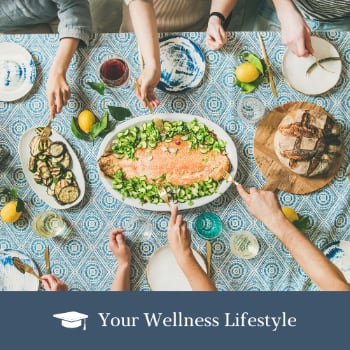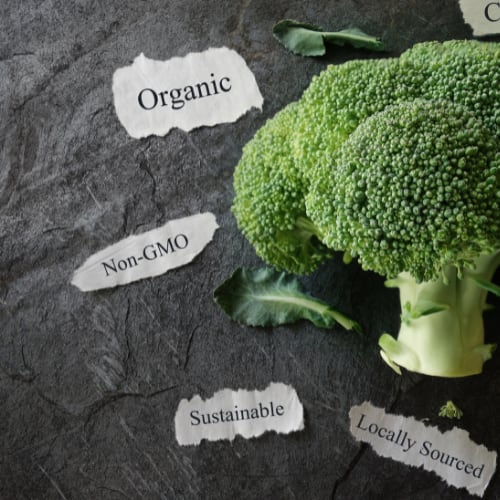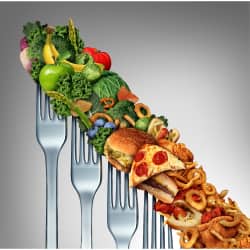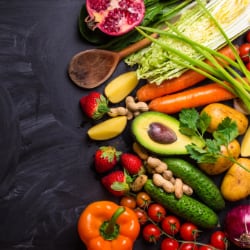 Food and Your Mood
Food and Your Mood
Food and Your Mood

-
Main Ideas
Learning Objective
Understand the significant impact of food on mental health, including its role in depression and anxiety.
Behavioral Objective
Adopt a balanced and whole-food-based diet to positively influence mood and mental well-being.
Key Thought
The gut-brain axis emphasizes the intricate connection between the gut and mental health, highlighting the importance of maintaining a healthy gut for overall well-being.
-
Main Ideas
Learning Objective
Understand the significant impact of food on mental health, including its role in depression and anxiety.
Behavioral Objective
Adopt a balanced and whole-food-based diet to positively influence mood and mental well-being.
Key Thought
The gut-brain axis emphasizes the intricate connection between the gut and mental health, highlighting the importance of maintaining a healthy gut for overall well-being.
-
Terms
- Environmental Working Group
- noun
The Environmental Working Group is an American activist group that specializes in research and advocacy in the areas of agricultural subsidies, toxic chemicals, drinking water pollutants, and corporate accountability. EWG is a nonprofit organization.
- Gut-Brain Axis
- noun
The gut-brain axis is the biochemical signaling that takes place between the gastrointestinal tract and the central nervous system.
- Organic
- adjective
Organic food is food produced by methods complying with the standards of organic farming. Standards vary worldwide, but organic farming features practices that cycle resources, promote ecological balance, and conserve biodiversity.
- Whole Food
- noun
Food with little or no refining or processing and containing no artificial additives or preservatives; natural or organic food.
-
Terms
- Environmental Working Group
- noun
The Environmental Working Group is an American activist group that specializes in research and advocacy in the areas of agricultural subsidies, toxic chemicals, drinking water pollutants, and corporate accountability. EWG is a nonprofit organization.
- Gut-Brain Axis
- noun
The gut-brain axis is the biochemical signaling that takes place between the gastrointestinal tract and the central nervous system.
- Organic
- adjective
Organic food is food produced by methods complying with the standards of organic farming. Standards vary worldwide, but organic farming features practices that cycle resources, promote ecological balance, and conserve biodiversity.
- Whole Food
- noun
Food with little or no refining or processing and containing no artificial additives or preservatives; natural or organic food.
Introduction
Did you know that food has an incredible impact on your health and mood? Learn more about why this happens and how you can improve your health with your food choices.
Food Affects Mental Health
One in five adults in America experience mental illness. The two most common mental illnesses are depression and anxiety. Our country is in the midst of a mental health crisis. So why are we wasting time talking about food? It turns out that food is one of the most important pieces of the puzzle when it comes to mental health and mood.
Have you ever had a week, month, or year of overeating processed junk food? If you have you can most likely relate to the sluggish, low, depressed mood that comes with it. Have you ever gone too long without eating and become the incredible hulk- irritable and angry? On the flip side- have you had months consuming a well balanced diet full of whole foods and plants? Chances are you felt energized and even downright giddy. That's because what you put into your body not only fills your belly, it feeds your mind.
Research has shown that unhealthy eating patterns- both undereating and overeating can cause depression, irritability, and fatigue. Having a depressed mood has been linked to a poor diet and obesity. Whereas a healthy diet has been shown to be protective against depression and anxiety. This is partially because a diet full of whole unprocessed foods, with healthy fats, protein, and fiber keeps blood sugar levels stable. But there is another reason that food has such an impact on mood- and it is known as the gut brain axis.
Gut-Brain Axis
Humans may have two brains- one in your head and the other in your gut. This gives "going with your gut" a whole new meaning. Inside of the gastrointestinal tract there are over 500 million neurons sending signals to the brain and vice versa. Scientists call this the enteric nervous system. The brain sends signals to the gut and as scientists recently learned, the gut sends messages back. The gut uses the nervous system as well as hormones and the immune system to communicate with the brain. 90% of serotonin receptors live in the gut.
Scientists have found that irritation and inflammation in the gut can trigger the central nervous system and cause mood shifts that cause depression and anxiety. This explains the higher rates of these disorders in people with Irritable Bowel Syndrome. The gastrointestinal tract is home to trillions of microorganisms that influence immune function. Recent studies have found the gut microorganisms play a part in immune system dysregulation in disorders of the central nervous system. The gut microbiome's influence on the immune system may also be a contribution factor to inflammation in neuropsychiatric disorders.
Ways to Improve Gut Health
If the gut has such an impact of mood then keeping it healthy is essential for both the body and mind. There are several ways to improve this relationship:
- Eating whole foods and avoiding processed ones
- Eat enough fiber through vegetables, whole grains, and legumes
- Reduce sugar intake
- Increase fruit and vegetable intake
- Add fermented foods to your plate (sauerkraut, kimchi, kombucha, etc)
- Reduce stress levels using meditation or deep breathing
- Exercise
- Take a probiotic
We are in the midst of a mental health crisis. Now that science has shown that there is an important connection between the brain and the gut, we have the ability to fight rising rates of mood disorders with the food we put on our plates.
How Does Processed Food Impact Us?
Processed food was invented as early as 1.5 million years ago. The first methods of processing were heat, drying, smoking, salting, and fermenting. Being able to process and preserve food in these ways was a massive advancement in our evolution as a species. It allowed us to travel greater distances, sustain quickly growing populations, and spend more time on other activities. So how did this helpful advancement turn into something so harmful to our species?
Long story short- we overdid it. It is now estimated that Americans consume more than half of their calories from processed foods. Not to mention, the methods of processing evolved as we did. In the 1900's we began to use new chemical preservatives as well as fake sweeteners and colors. These methods reduce the nutritional value of the food and create a hyperpalatable product by adding excess sugar, sodium, and fat.
All of the modifications made to food during processing have created some unpleasant side effects. Processed food has several health risks including increased risk of cancer, addictive, lowered nutrient intake, and increased calorie intake. These side effects are showing up in our rapidly rising rates of cancer, obesity, and food addiction. While processed food options may be more convenient they may also be more dangerous.
Categories of Processed Foods
It is important to know that there are categories of processed foods. Minimally processed foods are items such as bagged salad, precut fruits and vegetables, canned beans, frozen produce, and roasted nuts. These items are not full of artificial ingredients and still offer high quality nutrients. Then there are "ultra processed" foods that are high in sodium, refined sugars, and saturated and trans fats. These are the harmful foods that pose health risk- deli meats, snack cakes, sodas, chips, cookies, and candy.
Tips for Decreasing Processed Foods
Decreasing the amount of processed foods you eat will benefit your health, but you may be unsure of how to do it. Here are some tips:
- It's alive! Add an "alive" food to each meal. This could mean a banana, a peach, or a handful of spinach.
- Food prep. Spend some time once a week chopping up produce for snacks, and create a few meals to have on hand. This will help when needing something quick and convenient.
- Switch to water. You can use fruit or herbs to add flavor.
- Homemade makeover. Try to create your own potato chips in the oven or use olive oil and vinegar on your salad.
- Slow and steady. Make these changes at a slow pace. Lifestyle changes are more likely to stick when made over time.
Why Eat Organic?
We hear the term organic all the time. We see "organic" on labels and in commercials- but what does the term actually mean? Organic means produced without chemical fertilizer, pesticides, or artificial agents.
You may not only wonder what it means- but why things with the organic label are generally more expensive? Organic products are pricier for a few reasons; limited supply compared to demand, high labor and production costs, and the costs of becoming certified organic. So why should you pay more for less pesticides?
Why is Reducing Pesticide Intake Important?
Pesticides have been shown to have many negative effects on humans. These problems arise in all different bodily systems including; neurologic, reproductive, gastrointestinal, endocrinological, respiratory, and dermatological. A 2013 study demonstrated strong correlation between exposure to pesticides and birth defects, neurodegenerative disorders, reproductive issues, diabetes, and cancer.
- Pesticides kill living insects. Herbicides kill living plants.
- Insects and plants are living creatures killed by these chemicals.
- Humans are living creatures.
- Humans who eat chemicals designed to kill living creatures WILL be affected by the chemicals.
- Avoid eating or absorbing (skin, air, shower steam) anything that is chemical because it WILL have a negative effect on your body... you will not likely perceive it right away...
- It probably takes decades of exposure from multiple sources... but, the effect will not be good.
- In America, we call this toxic build-up "aging"... but, we shouldn't get sick, fat, or tired just because we're getting older.
Luckily organic products are becoming more widely available allowing people to make the switch. However it can feel overwhelming and cost prohibitive to switch every single item to organic all at once. Thats where the Dirty Dozen and Clean Fifteen come in. These are lists released annually by the Environmental Working Group (EWG) that show which fruits and vegetables have the highest levels of pesticides (Dirty Dozen) and which have the least (Clean Fifteen). These lists can be used to decide which items are most important to choose organic.
In the Resources section are two downloadable/printable lists of the Dirty Dozen and the Clean Fifteen for use at home- hang them on the fridge or take them as a cheat sheet at the grocery store!
Like any healthy lifestyle change, start slow and believe in yourself. Health is the greatest wealth, you are worth the investment!
Shot in home kitchen. Dr Wright introduces himself and gives an overview of the course and his views on food, from his years of clinical and personal experience.
Food... something we think about every day. But, how do we think about it? The life we experience is experienced through the physical body. The physical body operates within certain biochemical parameters that we call "physiology and metabolism". Physiology and metabolism operate by the energy resources provided... food.
So, food is essential to effect the life we experience. If we are not experiencing a "good" life, then we should look at our food environment. No, changing food will not change your annoying neighbor or the traffic on the interstate. But, it can change your ability to cope with the stress and achieve a level of happiness and wellbeing that you may not think possible.
In this module, here's what I want you to know:
You have a living body.
Put LIVING food into that body and your life experience will change for the better.
During this module you'll learn that food is MUCH MORE than just calories.
Natural-state foods can signal your body to activate healing and detoxification processes.
Processed foods tend to burden the body and, aside from triggering brain chemicals of desire, impose more stress and rarely provide healing signals and nutrients to the body.
FOOD IS MORE THAN CALORIES!
As you go through this module, think about a couple of concepts that can help you simplify your thinking and decision making around food:
- How close to nature is the food I am about to eat?
- Does this food show up in nature?
- Could I have eaten this exact food, in this exact form, 200 years ago?
Video closes on Dr. Wright chopping up vegetables and preparing a meal.
Welcome to my kitchen! If you are looking to increase your vegetable intake- then I have the perfect treat for you. Today We are going to make a micronutrient packed smoothie.
Start off by adding your frozen fruit. Today we will use organic banana and strawberries. Using frozen bananas in your smoothies gives them sweetness and a creamy soft serve texture. Next we will add our secret weapons. Chia seeds, flax seeds, and three giant handfuls of spinach. Lastly we will add coconut water to help this smoothie blend to perfection.
Here we go!
Blends smoothie
Takes sip of smoothie
Yum! So quick and delicious.It tastes like banana strawberry but thanks to the seeds and spinach packs a powerful health punch with essential fatty acids, fiber, and tons of micronutrients.
This recipe is loved by adults and children alike, so if you're wanting to boost your veggie intake try it today!


Why Organic Matters
Learn more about how you can reduce your dietary pesticide exposure risk using the Environmental Working Group's Clean Fifteen and Dirty Dozen annual food lists.


Activity Placeholder
The Activities section contains easy and fun, personal activities that enhance learning and encourage participation and discussion. Activities help to turn the knowledge acquired from the Read, Watch and Quiz sections into personal actions that over time become sustainable, healthier lifestyle behaviors.


Clean Fifteen - EWG 2021 Foods List
Whether organic or conventionally grown, fruits and vegetables are critical components of a healthy diet. However, many crops contain potentially harmful pesticides, even after washing, peeling or scrubbing, which the USDA does before testing each item.
Environmental Working Group

Dirty Dozen - EWG 2021 List of Foods
Since pesticide contamination varies by crop, it is important to understand which items are most or least contaminated. Additionally, fresh items that are most contaminated, such as spinach, strawberries and other Dirty Dozen fruits and vegetables, still have high levels of pesticides in their frozen forms.
Environmental Working GroupCourse Outline
![]() Session Expired from Inactivity
Session Expired from Inactivity
Do you want to?
9618 Jefferson Highway, Suite D-191
Baton Rouge LA 70809-9636
(888) 424-0032 |
support@supplementrelief.com
* Disclaimer: This page is available exclusively for SupplementRelief.com clients. None of the information on this website is intended to replace your relationship with your healthcare provider(s). Nothing should be considered medical advice. The information, knowledge, and experience shared on this website are the opinions of SupplementRelief.com. This site and its content are intended to enhance your knowledge base as YOU MAKE YOUR OWN HEALTHCARE DECISIONS in partnership with your qualified health professional.
* These statements have not been evaluated by the Food and Drug Administration. These products and services are not intended to diagnose, treat, cure, or prevent disease.
* There is NO GUARANTEE OF SPECIFIC RESULTS for the products or services offered, and the RESULTS CAN VARY for each individual. Any results claimed by our customers are based on individual experiences that are unique and cannot be guaranteed.
FirstFitness Nutrition and NuMedica may be promoted and sold on the internet ONLY by Authorized Resellers who have been approved by and have registered their website domain with these companies. They strictly prohibit, and actively monitor, the UNAUTHORIZED SALE or RESALE of their products in ALL online public shopping portals including Amazon, eBay, and others and into other countries. All products purchased in SupplementRelief.com are for PERSONAL USE ONLY and CANNOT BE RESOLD to others. Please report violations of Reseller Policy directly to FirstFitness Nutrition at 800.621.4348 and to NuMedica at 800.869.8100.
The content and photographs on this website are copyrighted or Licensed Material and may not be downloaded for other than personal use. Republication, retransmission, reproduction, or any other use of the content or photographs is prohibited. ©2010-2024 SupplementRelief.com.
Are you sure you want to remove this item?





